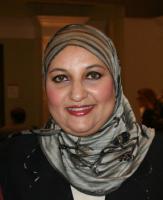Updated: Experts Reflect On Egypt'S Turmoil
October 18, 2013

A cross section of Middle East analysts including UMD Communication Professor Sahar Khamis discuss the implications of the latest wave of violence in Egypt.
by Aljazeera
The body count is rising across Egypt. The latest crackdown on demonstrators by the interim government has the potential to ignite a prolonged period of violence in the Arab world's most populous country.
The recent wave of unrest began when the military and social movements ousted Mohamed Morsi, Egypt's first elected president. Critics of Morsi and his backers in the Muslim Brotherhood say the former president was acting like a dictator who had lost popular support, and thus he needed to be deposed in order to pave the way for new elections.
While the causes of Egypt's political and social problems are debatable, there is consensus that the country is facing exceptional chaos and bloodshed.
To help shed light on the current crisis, Al Jazeera canvassed opinions from several leading Middle East experts to help analyze recent developments.
Dr Sahar Khamis is an Assistant Professor in the Department of Communication at the University of Maryland, College Park. She is an expert on Arab and Muslim media and the former of the Head of the Mass Communication Department in Qatar University.
Two and half years after the historic, peaceful and popular January 25 revolution ended the 30 year dictatorial rule of Hosni Mubarak, Egypt has found itself witnessing tragic events - that of unprecedented escalating violence, deep divisions and alarming polarisation. The unique grassroots uprising characterised by unity and solidarity that once set a great example for the whole world to admire and emulate seems to be no more.
An important misconception requiring clarification is that the current crisis is between the "army" and the "Muslim Brotherhood", disregarding the fact that many of the peaceful protesters who have been demonstrating on the streets of Cairo and abroad do not necessarily belong to the Muslim Brotherhood, nor affiliated with any particular political or religious group. Many of these men, women and children are simply ordinary Egyptian citizens who are deeply concerned about the derailing of the democratic process in their country and the unjustified repression and widespread violence that results from it. One important irony which needs to be highlighted is that many of those who attacked the Muslim Brotherhood and President Mohamed Morsi for failing to establish a true participatory democracy in Egypt in one year are enthusiastically welcoming resorting to non-democratic measures to depose a democratically-elected president through allying themselves with the army generals who are known for overstaying their welcome, and are even cheering on the horrific violations of human rights which are currently taking place in Egypt while simultaneously describing themselves as "liberals!"
A critical question that needs answering is what the best vision for bringing Egypt back to the democratic path is. Moreover, how can Egypt ensure that it does not turn into a military-ruled state again, especially after the imposition of the curfew and the emergency law once more. How can it restore much-needed trust, dialogue and inclusion between the different parties after the country has torn itself apart? The answers to these complex questions cannot come from one party or group alone. It truly needs a "collective" brainstorming effort which transcends political, ideological and religious differences to put an end to this ongoing tragedy before it is too late.
To read more, please click here.

